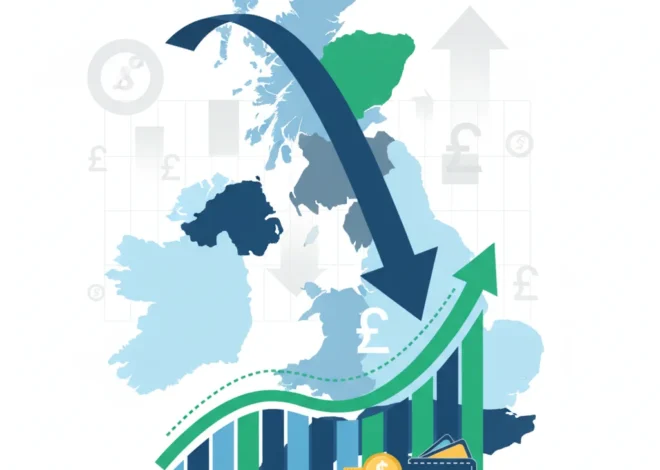
Macron’s Gambit: What Sébastien Lecornu’s Premiership Means for France’s Economy and Global Investors
In a political maneuver that has sent ripples across the European financial landscape, French President Emmanuel Macron has reappointed Sébastien Lecornu as Prime Minister. This decision, following a tumultuous snap parliamentary election, is far more than a simple cabinet reshuffle; it is a high-stakes bet on stability in an era of profound political fragmentation. For business leaders, investors, and finance professionals, understanding the nuances of this appointment is critical to navigating the uncertain waters of the European economy.
The move comes after Macron’s centrist alliance failed to secure an absolute majority, leaving France in a state of political deadlock. The appointment of Lecornu, a figure from the center-right with a reputation as a pragmatist and a steady hand, is a clear signal of Macron’s strategy: to build a broader coalition and stave off the legislative paralysis that threatens his economic reform agenda. But will this gambit pay off? And what are the downstream implications for the French stock market, European banking, and international investing strategies?
The Political Chessboard: Why Lecornu, Why Now?
Sébastien Lecornu is not a newcomer to the French political scene, but his ascent to the premiership is a calculated choice. Previously serving as the Minister of the Armed Forces, he has cultivated an image of competence and seriousness. His political roots lie with the mainstream center-right party, Les Républicains, making him a potential bridge to conservatives whose support Macron desperately needs to pass legislation. This is a departure from previous appointments, signaling a strategic pivot towards compromise and stability over ideological purity.
The context for this decision is the seismic shock of the recent legislative elections. Macron’s “Ensemble!” coalition fell short of the 289 seats needed for an absolute majority, while both the far-right National Rally, led by Marine Le Pen, and the new left-wing alliance, Nupes, made significant gains. According to reports from the Financial Times, this outcome has plunged France into a period of uncertainty not seen in decades, forcing the President into a “cohabitation” scenario where he must govern with a hostile parliament.
Lecornu’s task is monumental: to form a government capable of commanding a majority on a case-by-case basis. This will involve painstaking negotiations and compromises on every major policy initiative, from the national budget to pension reforms. His success or failure will directly impact business confidence and the stability of the French economy.
Market Tremors: The Economic Fallout of Political Instability
Global markets abhor uncertainty, and the recent political turmoil in France has been no exception. The immediate aftermath of the election saw a notable reaction in French financial assets. The spread between French and German 10-year government bonds—a key indicator of perceived risk—widened significantly. This suggests that investors are demanding a higher premium to hold French debt, anticipating potential fiscal slippage or political gridlock.
The table below illustrates the market’s immediate reaction, showcasing the tangible impact of political risk on core financial metrics. This data reflects the shift in investor sentiment as the prospect of a hung parliament became a reality.
| Financial Indicator | Pre-Election (Average) | Post-Election Peak | Implication for Investors |
|---|---|---|---|
| CAC 40 Index | ~6,500 points | Dropped below 6,000 points | Increased volatility and short-term bearish sentiment in the French stock market. |
| France-Germany 10-Year Bond Spread | ~50 basis points | Widened to over 75 basis points (source) | Higher borrowing costs for France, reflecting heightened credit risk. |
| Euro (EUR/USD) | ~$1.05 | Briefly dipped towards $1.03 | Pressure on the single currency due to instability in its second-largest economy. |
This market nervousness underscores the immense challenge facing Lecornu. His government’s ability to project stability and fiscal discipline will be paramount. Any failure to pass a credible budget or advance pro-growth reforms could trigger further sell-offs, impacting everything from large-cap stocks on the CAC 40 to the burgeoning French financial technology sector, which relies on a stable regulatory and economic environment to attract venture capital. The entire ecosystem of finance and trading in Paris is watching closely.
Navigating the Labyrinth: Key Policy Challenges Ahead
Prime Minister Lecornu inherits a complex and contentious policy agenda. The key battlegrounds will define his premiership and determine the long-term trajectory of the French economy.
1. Fiscal Consolidation vs. Social Spending
France’s public debt is hovering around 110% of GDP, a figure that credit rating agencies and the European Commission are monitoring with increasing concern. Macron’s agenda called for fiscal prudence, but both the far-right and the left-wing alliance campaigned on platforms of increased social spending and a rollback of previous reforms. Lecornu must thread the needle between maintaining fiscal credibility, which is crucial for keeping borrowing costs in check, and appeasing opposition parties to avoid social unrest and legislative defeat. This balancing act is central to the field of economics and will be a case study for years to come.
2. The Future of Pension and Labor Reforms
Macron’s most controversial reform—raising the retirement age—was pushed through using executive powers and sparked widespread protests. The new parliamentary arithmetic makes any further pro-business labor market reforms nearly impossible. In fact, there will be immense pressure to reverse previous changes. For international companies operating in France, this creates significant uncertainty around labor costs and regulatory compliance. The stability of the French banking sector, which is heavily invested in the domestic economy, also depends on a predictable policy environment.
3. Energy Transition and Industrial Policy
France is at a crossroads in its energy policy, balancing its traditional reliance on nuclear power with the need to accelerate renewable energy deployment. This requires massive long-term investing and a stable policy framework. A deadlocked parliament could delay critical projects, jeopardizing France’s energy independence and climate goals. Lecornu’s ability to forge a cross-party consensus on this issue will be a key indicator of his government’s effectiveness.
The View from Abroad: Implications for Europe and Global Finance
A weakened and politically divided France has significant implications beyond its borders. As the Eurozone’s second-largest economy and a key driver of EU policy, French domestic politics can easily become a source of systemic risk for the entire bloc. A government in Paris that is consumed by internal battles will be less able to provide leadership on critical European issues, from support for Ukraine to the ongoing debate over EU fiscal rules. This leadership vacuum could not come at a worse time, given the geopolitical and economic challenges facing the continent.
For global investors, the situation demands a recalibration of risk models. For years, the core of the Eurozone (Germany and France) was seen as a bastion of stability. That assumption is now being tested. Portfolio managers with heavy exposure to European equities or bonds must now consider the heightened political risk premium associated with France. This could lead to a reallocation of capital towards other markets, impacting international trading flows and asset valuations.
Furthermore, the rise of populist parties on both the right and left could challenge France’s commitment to free-market principles and European integration, a cornerstone of the post-war order. As one political analyst noted in a recent brief, “The ‘French anchor’ of the European project is dragging,” a sentiment that captures the anxiety felt in Brussels and Frankfurt (source).
Conclusion: A Precarious Path Forward
Emmanuel Macron’s appointment of Sébastien Lecornu is a pragmatic response to a political crisis. It is an attempt to build bridges and govern from the center in a nation that is increasingly polarized. However, it is not a silver bullet. The fundamental challenges of a hung parliament, a deeply divided electorate, and immense economic pressures remain.
For the financial community, the coming months will be a crucial test. The ability of Lecornu’s government to navigate the legislative labyrinth and maintain a course of fiscal responsibility will determine whether market confidence is restored or if France enters a prolonged period of instability. This appointment is the opening move in a complex new chapter for France—one that will have lasting consequences for its economy, the future of the European Union, and the global investing landscape.


